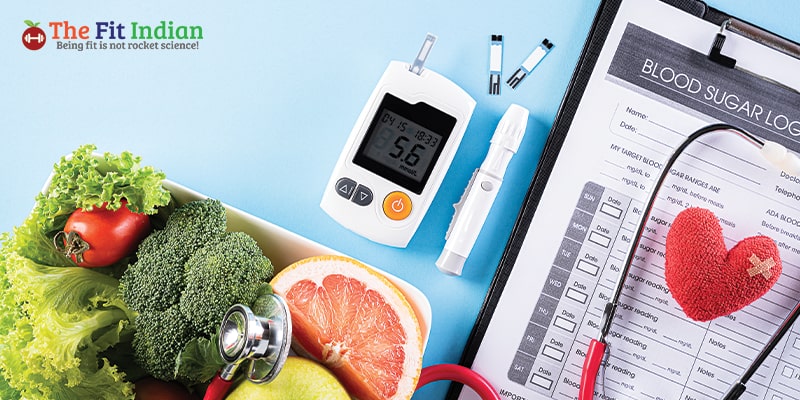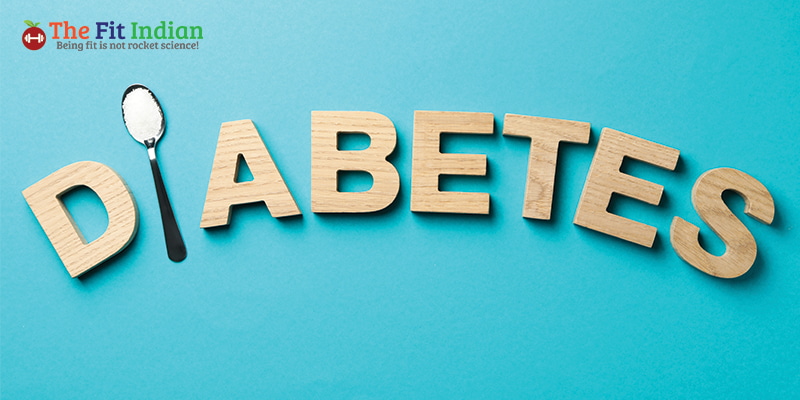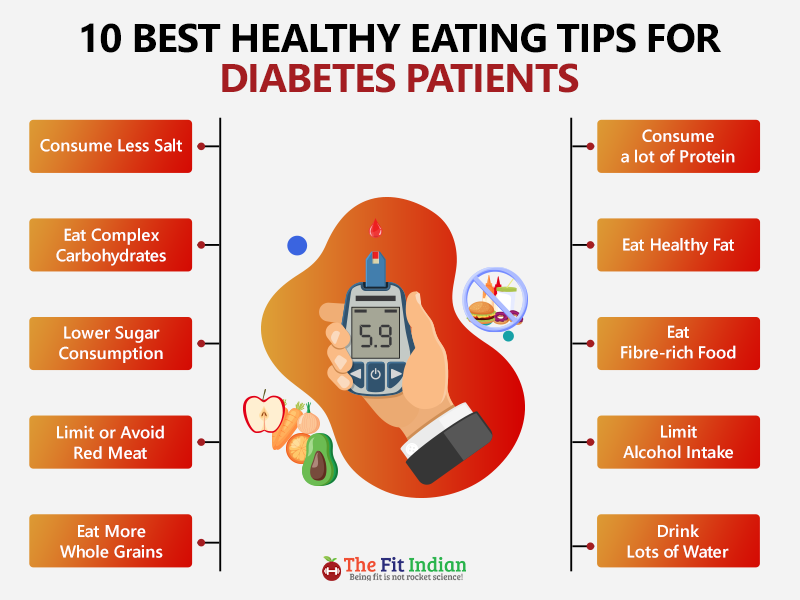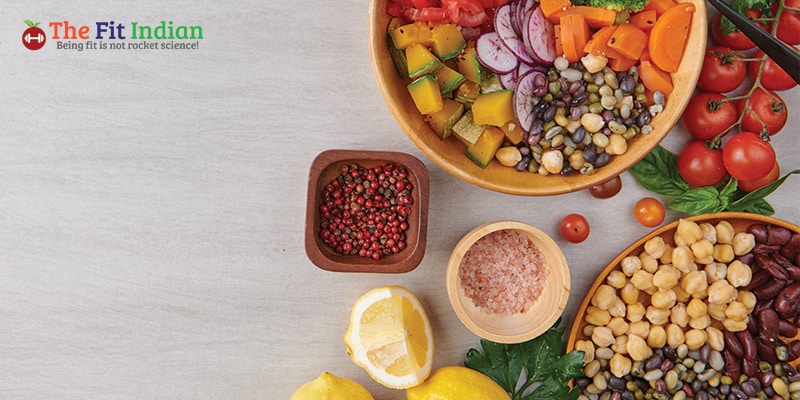10 Healthy Eating Tips for Diabetes Management
| Author: Manoja Kalakanti
There are very few health conditions that are as discussed as diabetes. This is a condition that has seen a steady rise in recent times due to lifestyle factors. As is the case with several other diseases, your eating habits play a central role in both causing and managing them. Diabetes occurs due to a rise in sugar levels, which is influenced by the food you eat. So, management of this condition is directly related to your eating habits. While a diet plan to manage the condition may seem overwhelming, it is no different than any other healthy diet recommendation. There is no special food for people with diabetes, nor are there any extreme restrictions. It involves a healthy eating practice that promotes eating nutritious whole foods and home-cooked meals and avoiding packaged, refined foods. While many factors such as genetics, age, race, other health conditions and lack of physical activity are responsible for causing diabetes, food plays a critical role here. So, what is the relation between food and this chronic condition? Let’s find out!
While a diet plan to manage the condition may seem overwhelming, it is no different than any other healthy diet recommendation. There is no special food for people with diabetes, nor are there any extreme restrictions. It involves a healthy eating practice that promotes eating nutritious whole foods and home-cooked meals and avoiding packaged, refined foods. While many factors such as genetics, age, race, other health conditions and lack of physical activity are responsible for causing diabetes, food plays a critical role here. So, what is the relation between food and this chronic condition? Let’s find out!
The Link Between Diabetes and Eating Healthy
Diabetes is a chronic condition that occurs when your blood sugar or blood glucose level is very high. Blood glucose is the source of energy that you receive from the food consumed. This glucose is transported to the cells, which uses it for energy. Insulin, a hormone made in the pancreas, transports glucose to the cells. Sometimes the body doesn’t make enough insulin or doesn’t make them at all, resulting in the glucose not reaching the cells and instead, it stays in the blood. This causes a string of health problems, including diabetes. The food you eat either raises the sugar level quickly or at a slow rate. Hence, food is closely connected to the condition. You can understand the link better based on studies here.
This is a chronic condition that cannot be cured but can be managed with a change in lifestyle. You can live a healthy and normal life by following a proper diet. But eating isn’t the only way to manage it; you must manage stress and exercise regularly to keep your weight under control and stay fit. Unless there is a genetic predisposition, you can even prevent diabetes from ever occurring. This is why experts reiterate the importance of eating healthy regardless of your health.
The diet emphasizes the need to control salt, sugar, and alcohol consumption, if not outrightly avoid them. We know that food plays a huge role in causing and dictating the course of diabetes. Are there any tips you can follow to ensure that you eat right? Read on to find out!
10 Best Healthy Eating Tips for Diabetes Patients
Diabetes is a complicated disease. We already know about the link between the condition and food. Your eating habits directly impact your blood sugar levels, and thus it is imperative to pay attention to what and how you eat to control diabetes. You can always get in touch with a nutritionist to get a customized diet plan.
Not eating the right food results in an inability to control blood sugar levels and hampers your weight-loss effort, which further worsens the condition. Bad eating habits can also increase the risk of hypertension, which doubles the risk of heart diseases and strokes. These reasons should convince anyone about the importance of maintaining a balanced diet for diabetes. Without further ado, let’s look at the healthy eating tips.
1. Consume Less Salt
This is advice that you must have come across before. Doctors often suggest limiting salt intake as it can worsen existing conditions. Salt increases risk of high blood pressure, which in turn, increases the risk of heart diseases. When you have diabetes, you are already at risk of these conditions. Many of the pre-packaged foods also contain high amounts of salt so always check the package carefully. These foods are bad for a diabetic for more than one reason, hence, it is best to avoid them or consume in limited quantities.
2. Eat Complex Carbohydrates
Among the most healthy foods for people with diabetes are complex carbohydrates. The reason for this is as simple as it gets. Simple carbs such as sugar, chocolate, jaggery, carbonated drinks and maida do not contain any fibre; hence, they are absorbed by the body quickly, which results in a spike in blood sugar. Complex carbs such as wheat, wheat bread and vegetables are rich in fibre and are absorbed and digested slowly, so they do not cause any such spike.
3. Lower Sugar Consumption
Yes, it makes everything taste so much better, that’s the reason why we are addicted to it! But sugar is often referred to as ‘white poison’ for its debilitating effects on our health. And what’s worse? It’s everywhere; not only do we add it to our tea, coffee or pastries, but it is also a common ingredient in almost all packaged food that we consume. But cutting down on sugar can be a difficult task. So, start slowly by swapping it with healthier choices and limiting its use. You can have fruit juices, tea or coffee without sugar or with artificial sweeteners.
4. Eat More Whole Grains
All you need to do here is make a simple swap. Eat brown rice instead of white, brown bread instead of white bread and whole wheat flour instead of regular. White rice, bread and regular flour are refined and lose their nutrients. These are also responsible for causing spikes in blood sugar levels apart from causing other health issues.
5. Limit or Avoid Red Meat
Processed meat and red meat can have a negative impact on blood sugar levels. Foods such as sausages and beef can also cause heart problems and even cancer. While consuming protein is essential, try to replace red or processed meat with healthier alternatives such as:
- Eggs
- Fish
- Nuts
- Poultry
- Pulses
6. Consume a lot of Protein
Whether its source is vegan, vegetarian or non-vegetarian, consuming high amounts of protein is advised. Vegetarian foods such as low-fat cheese, homemade paneer, non-vegetarian foods such as lean meat, fish and eggs and vegan foods like legumes, soybean, tofu and pulses are some of the best sources of protein.
7. Eat Healthy Fat
Not all fat is equal, and this distinction and understanding of it are crucial in keeping your blood sugar level under control. While good fats such as nuts, seeds, avocados, and oily fish provide good cholesterol, bad or saturated fats increase bad cholesterol. Red meat,processed and packaged foods, fried foods, cakes, and mayonnaise are examples of bad fats. These types of food can cause heart diseases as well.
8. Eat Fibre-rich Food
Fibre helps in keeping blood sugar levels under control. Fruits, raw and cooked vegetables, and whole grains are some of the best sources of fibre. Include these foods in your daily diet to receive an adequate amount of fibre.
9. Limit Alcohol Intake
It is vital to ensure that your calorie intake is kept under check. Alcohol is high in calories and can throw your weight-loss and calorie control plans in disarray. You do not have to quit drinking alcoholic beverages completely. Just ensure that you lower the consumption and do not engage in binge drinking.
10. Drink Lots of Water
Drinking water can never be bad for your health; unless, of course, you overdo it. Other than its myriad health benefits, water intake is also helpful for patients with diabetes. Even though it is not considered a nutrient, water is a must not only for good health but also for survival. 60% of our body is made up of water. It plays a crucial role in keeping the body function by nourishing the cells, organs and tissues. Apart from these functions, water also plays an important role in flushing out excess sugar from the body.
A diet alone won’t suffice, you must exercise regularly and lead a stress free life. The effect of exercise on controlling diabetes is widely studied and backed by experts. Now that you have a good idea of some crucial diet tips let’s look at a sample of a recommended diet for diabetics.
Diet Plan and Nutrition to Manage Diabetes
The above tips are general rules of thumb when it comes to managing the condition. But let’s go one step further and look at a daily diet plan and some nutritional advice from a professional nutritionist. For more information on a comprehensive diet plan, book a consultation with a nutritionist here.
1. Eat whole fruits rather than drink juices
2. Include fiber and low GI (0-55) foods like:
- Lentils
- Beans
- Green leafy vegetables
- Fish
- Berries
- Soya
- Chickpeas
- Whole-grain foods
3. Include herbal teas like:
- Ginger tea
- Peppermint tea
- Tulsi leaves tea
4. Exercise regularly and maintain a healthy weight
5. Include karela (Bitter Gourd) juice, methi seeds water into the diet
6. Seeds and nuts are the major source of all minerals; indulge them daily
7. A high-fibre diet does not cause an insulin spike
8. Include infused waters
9. Fibre slows down digestion and the absorption of carbohydrates; hence, it may not raise your blood sugar as quickly as refined foods do. So include whole foods like:
- Whole wheat roti
- Bajra
- Jowar
- Ragi
- Buckwheat
- Rye
- Oats
- Go for essential fats like:
- Flaxseed oil
- Olive oil
- Chia seeds
- Walnuts
- Pumpkin seeds
- Sunflower seeds
- Avoid trans-fat foods like vanaspati, junk foods, and pastries
These tips can come in handy when you are trying to manage diabetes. Now let’s take a look at a detailed daily diet for diabetic patients. There is no one shoe that fits all; this is especially true in the case of managing this condition. No one diet will work for all, since there are different types of diabetes, and one individual’s body is different from the others. But there are certain foods that do work for most. Below is a typical diabetes food guide for a patient to manage the condition.
There is no one shoe that fits all; this is especially true in the case of managing this condition. No one diet will work for all, since there are different types of diabetes, and one individual’s body is different from the others. But there are certain foods that do work for most. Below is a typical diabetes food guide for a patient to manage the condition.
- Early Morning: Aloe vera juice or lukewarm cinnamon water 1 glass
- Breakfast 9 AM: Moong dal cheela 2 with green chutney
Or
- Egg multigrain sandwich (1 sandwich)
- Morning snack 11 AM: Guava or kiwi or orange any other fruit
Buttermilk with flax seeds powder (1 glass)
- Lunch 1 PM: Broccoli soup (1 bowl) or Mixed vegetable salad (1 bowl)
Boiled Quinoa khichdi 1 bowl with grilled chicken (2 steaks) or green leafy curry 1 cup
Curd (1 cup)
- 3 PM: Green tea (1cup)
-
5 PM Snack: Roasted chickpeas (1 cup) or mixed nuts (handful)
- Dinner 7 PM: Baked salmon (2 fillets)
Or
Lokee stuffed roti (1 medium) with vegetable salad and bhindi curry (1 cup)
- Bedtime: Isabgol water 1 glass
Following the above diet and nutrition tips can help you manage the condition and live a normal healthy life. Talk to a doctor to get a clearer picture and a diet plan specific to you.
Bottomline
Diabetes has no cure, but with a change in lifestyle, including your diet, you can live a healthy, long life. Unless genetics is a factor, you can prevent the condition from occurring in the first place through healthy eating and living. A proper diet and regular exercise can go a long way in combating the condition. So, if you already have diabetes, consult a doctor for advice on the lifestyle changes needed to overcome this condition. With the right steps, you can live a long and happy life, even with diabetes.
FAQ’s
1. What is the dietary management of diabetes?
Diet plays an important role in the management of this condition. Dietary management here involves eating healthy foods such as fruits and vegetables and avoiding unhealthy foods. Eating meals at the proper time is also crucial.
2. Which nutrient is good for diabetic patients?
Diabetes patients must consume highly nutritious whole foods. This includes fruits, vegetables, nuts, seeds, fish and beans.
3. What are 5 recommendations for a healthy diet for someone with diabetes?
It is vital for someone with the condition to follow a planned diet. Here are some recommendations for those with diabetes:
-
Cut down on sugar
-
Avoid unhealthy fats usually found in red meat and dairy
-
Consume healthy fats found in avocados and nuts
-
Limit refined carbs and include more high-fibre food
-
Eat fresh fruits and vegetables
4. Why is healthy eating important for diabetes?
Eating right is one of the most critical parts of treatment for the illness. Food impacts blood sugar levels, and eating right keeps it under control.
5. How often should a person with diabetes eat?
The right diet and the timing of the meal are also important for a person with diabetes. You must have your meals at the same time every day and at regular intervals.
6. Is banana good for a person with diabetes?
Fruits are considered to be a good source of nutrition for people with diabetes. Eating bananas in moderation is highly beneficial for people with this condition.
7. What is a good daily menu for a person with diabetes?
The daily healthy menu for people with this illness is based on healthy, nutritious food. This would involve a diet rich in fruits, vegetables, healthy fats such as nuts and avocados, low-fat dairy, beans and whole grains.
8. What foods are bad for people with diabetes?
Anything that has a high amount of sugar, such as sugary beverages, processed foods, white rice and bread, trans or saturated fats.
9. What drink lowers blood sugar?
Drinking water is the best way to lower blood sugar. You can also have tea; many types of tea can be healthy, especially green tea.
10. How can I flush sugar out of my system fast?
To flush sugar out of your system, you can drink a lot of water, eat more protein and fruits. You should also manage stress and get adequate sleep.




Manoja Kalakanti